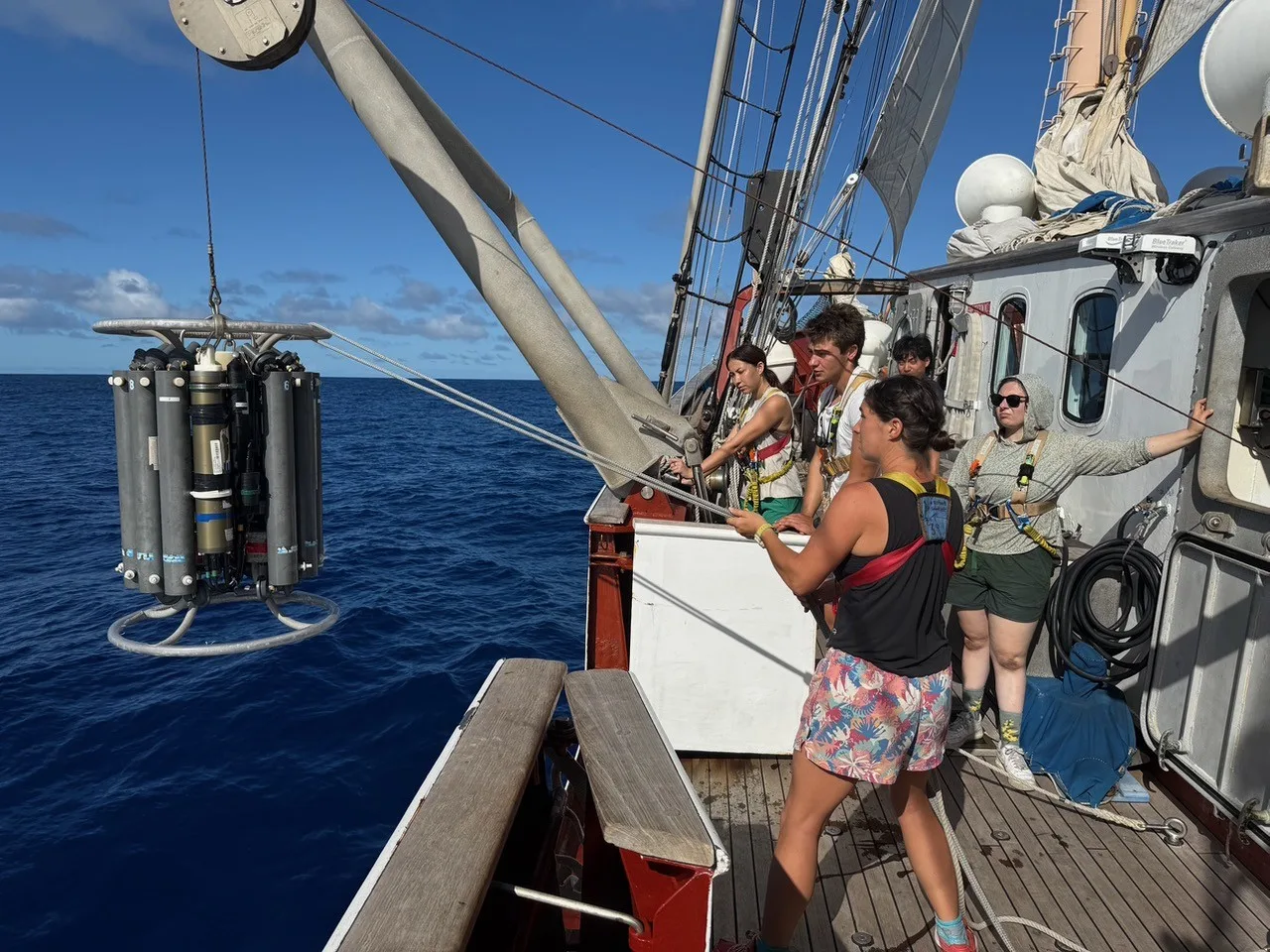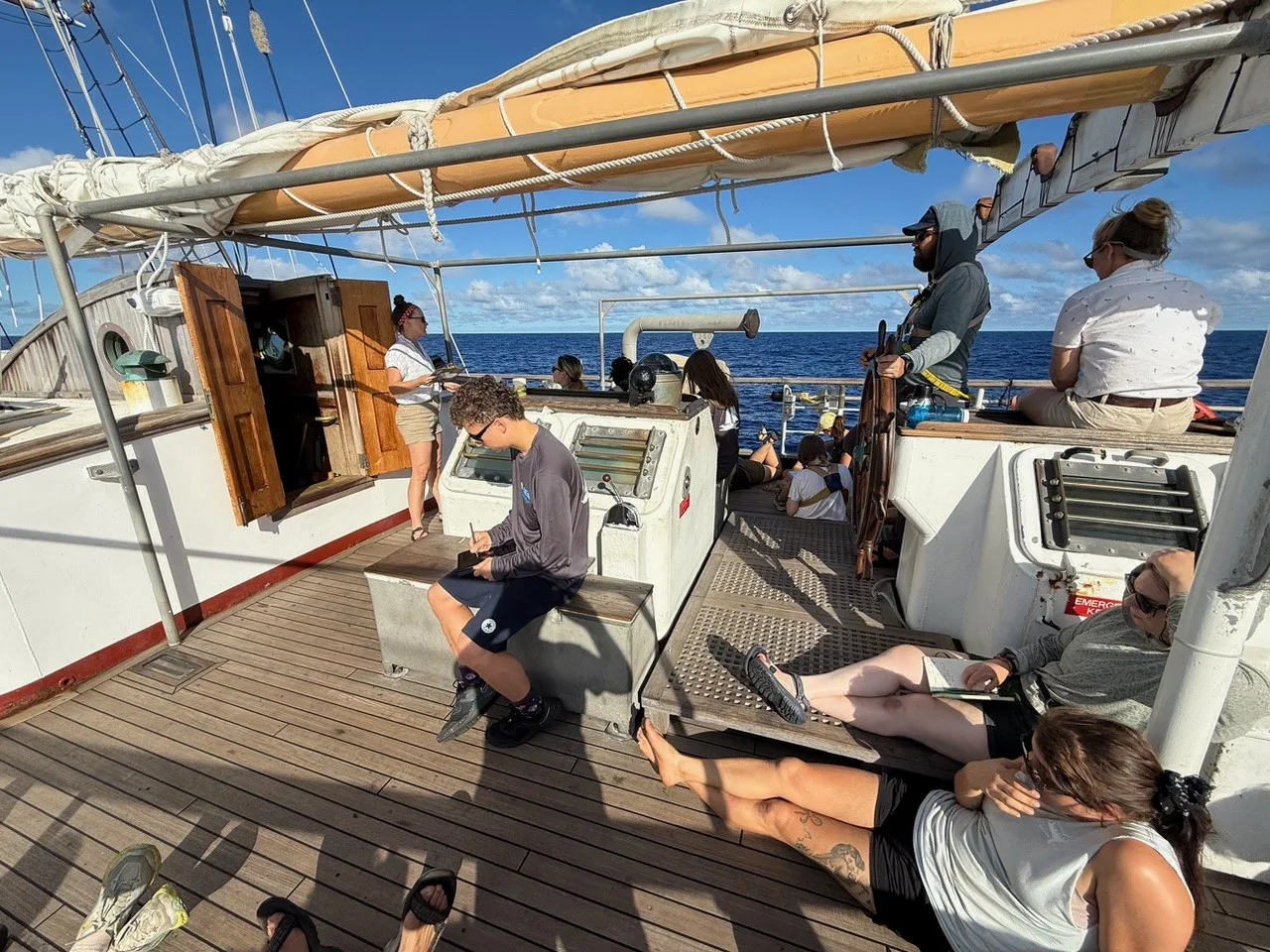Programs Blog
Our mission

June 14, 2025
Position: 16˚ 37.7’S by 146˚50.2’W; 65 nautical miles southwest of Fakarava Atoll, Tuamotu Archipelago.
Weather: Light winds from the east, clear skies, motor sailing under staysails.
Greetings from the South Pacific! The two previous blogs by Emmy and Sophie have given you a really good idea of how busy the past 48 hours have been for us. We left the dock in Papeete just 32 hours ago, but have already eaten our first 5 meals underway, collected our first plankton tows, and had our first class together on the quarterdeck. In short, we’re off to a great start, helped by the gentle winds and seas around us.
Each SEA program has a theme and topic. Our program and voyage is titled “Ocean Policy: Marine Protected Areas.” As the title suggests, we’re studying the important topic of how our ocean spaces are being governed, particularly with conservation of biodiversity of the oceanic ecosystems in mind. A good way to frame our undertaking is the motto of the ongoing United Nations Ocean Decade: “The science we need for the ocean we want.” This tagline captures very well the multiple goals of our voyage.
With the research capabilities of our ship we’re able to gather data on important parameters that can speak to the health of the tropical pacific: abundance and diversity of planktonic life, the amount of heat the ocean has gained and retained over the past two decades, the degree to which the upper ocean has grown more acidic as it absorbs the ever increasing amounts of carbon dioxide in our atmosphere. These are all topics of student research onboard and together with experiencing the ocean firsthand on our sailing ship, help us all think about what kind of a future we want for our ocean.
Helping us think about how we can get to that future is visiting professor Beth Mendenhall from the University of Rhode Island. With her leadership, the students are developing an understanding of Marine Protected Areas (MPAs) as complex political and legal objects that serve multiple goals, sometimes primarily biodiversity conservation. Dr. Mendenhall’s lectures and reading groups provide an overview of the ‘state of the field,’ while student projects focus on real world MPAs in the eastern Pacific region.
Onboard the ship we have 15 students hailing from universities and colleges from Hawaii, California, Wisconsin, Texas, Massachusetts, Colorado, North Carolina, and more. The students are working (and learning) under the close supervision of 11 professional crew including mates, marine technicians, stewards, and engineers, led by Captain Allison Taylor who is also teaching the students skills to make them better mariners, observers of their environment, while also helping them gain leadership skills.
I hope this background and context will be helpful as you read the coming blogs, likely telling you about a whole range of experiences students will have on our five-week ocean voyage. Some of those stories will tell you about work in the lab, of topics they learn during our afternoon classes, of starry skies at night, or of days spent setting and striking sails as we keep our bow pointed toward distant Hawaii. I hope you’ll keep reading and so come along for our voyage!
Jan Witting
Professor of Oceanography, Chief Scientist, Sea Education Association

Recent Posts from the Ships
- Ocean Classroom 2024-A collaborative high school program with Proctor Academy
- Collaborations and Long-term Commitments: SEA’s Caribbean Reef Program Sets a Course for Coastal Programs that Compliment Shipboard Experiences.
- Sea Education Association students prepare for life underway using state of the art nautical simulation from Wartsila Corporation.
- SEA Writer 2022, Magazines From the Summer SEA Quest Students
- Technology@SEA: Upgrades Allow Insight into Ocean Depths
Programs
- Gap Year
- Ocean Exploration
- High School
- Science at SEA
- SEA Expedition
- SEAScape
- Pre-College
- Proctor Ocean Classroom
- Protecting the Phoenix Islands
- SPICE
- Stanford@SEA
- Undergraduate
- Climate and Society
- Climate Change and Coastal Resilience
- Coral Reef Conservation
- Marine Biodiversity and Conservation
- MBL
- Ocean Exploration: Plastics
- Ocean Policy: Marine Protected Areas
- Oceans and Climate
- Pacific Reef Expedition
- The Global Ocean: Hawai'i
- The Global Ocean: New Zealand